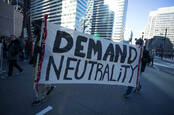This article is more than 1 year old
US net neutrality bill is only two pages long. And that's potentially a good thing
May stand a chance of passing as it's simple: Make ISPs Title II common carriers. Boom, done
Net neutrality legislation is back before Congress, and the latest bill – push by House and Senate Democrats – only does a single thing: it reclassifies broadband providers as common carriers.
Senators Ed Markey (D-MA) and Ron Wyden (D-OR) on Thursday introduced the Net Neutrality and Broadband Justice Act, which would label broadband internet providers in the United States as Title II common carriers, giving the FCC authority to regulate them.
"In 2022 broadband isn't a luxury: Without it students can't learn, entrepreneurs can't innovate, and seniors can't access telemedicine," Senator Markey said during a press conference. The bill [PDF], such as it is, is brief and does little: it's two pages long and simply adds broadband internet access as a type of telecommunications service covered under Title II.
Title II of the 1934 FCC Act [PDF] classifies telecommunications service providers that enable communication "by wire or radio" as common carriers able to be regulated in much the same way as utilities: if it flows through your pipes and the public rely on it, access has to be fair and equitable. That may matter if certain cable and comms giants unfairly prioritize certain content providers over others.
Broadband internet first fell under the FCC's Title II authority in 2015 via the Open Internet Order, back when President Obama was in the White House. Because the FCC enacted the policy on its own, the regulator's chairman under President Trump, Ajit Pai, was able to roll back the order and reclassify ISPs under Title I, eliminating its oversight capability.
Congresswoman Doris Matsui (D-CA), who is sponsoring the House version of the Net Neutrality and Broadband Justice Act, said that deregulation under the MAGA administration left America's broadband internet without consumer protections.
"For the online ecosystem to remain a dynamic engine of innovation, we need clear rules of the road that prevent internet service providers from blocking, slowing and prioritizing web traffic," Rep Matsui said, adding that the new bill would return such regulatory powers to the FCC.
But regulatory powers and their specifics aren't mentioned in the new bill, which Markey told The Register was the entire point.
"This bill is different, but consistent with the previous approach of giving the FCC regulatory authority," Markey said. "What it won't do is lock the FCC into its 2015 posture, instead giving it broad authority to create policies that reflect the changing nature of the internet in 2022."
Can this net neutrality bill pass?
According to Markey, 76 percent of surveyed US residents agree that internet service is just as important as electricity or water in the modern world. From Senator Wyden's perspective, net neutrality isn't a partisan issue for most Americans.
"There is not, among citizens, even a small iota of partisanship on this issue. They see this as a fundamental aspect of being able to participate in American society," Markey said during the press conference.
But net neutrality has been a polarizing idea in Congress since the Obama era: does this bill, even with as little as it does, stand a chance of passing?
Katharine Trendacosta, associate director of policy and activism at the Electronic Frontier Foundation, told The Register it may not have a "better" chance of passing through Congress than previous bills, though it is a step in the right direction by doing little more than giving the FCC the authority to make its own rules that move with the times, rather than codifying them in a Congressional bill.
"This bill recognizes that the internet is an ever-changing thing and that getting in the weeds of paid prioritization versus reasonable network management and so on was not doing what the people need: a guarantee of a net neutral web," Trendacosta told us.
The Net Neutrality and Broadband Justice Act will head to a Senate committee for debate before it can advance further. With Congress set to go on recess in a day, the bill won't be up for discussion for some time, no matter how brief. ®

